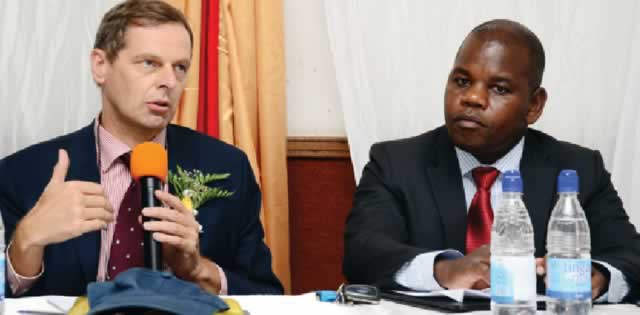
The Sunday News

 The new European Union (EU) ambassador to Zimbabwe, Mr Phillippe van Damme (left) and the Zimbabwe National Chamber of Commerce (ZNCC)’s Bulawayo branch chairperson, Mr Crispen Mugova
The new European Union (EU) ambassador to Zimbabwe, Mr Phillippe van Damme (left) and the Zimbabwe National Chamber of Commerce (ZNCC)’s Bulawayo branch chairperson, Mr Crispen MugovaA EUROPEAN Union (EU) official has allayed fears that the viability of local industries would be threatened once Zimbabwe implements the Economic Partnership Agreements (EPAs) signed with the EU.
Zimbabwe signed the EPA in 2012 with EU which aims at removing barriers to trade and enhancing co-operation in all areas related to trade. EU is a traditional importer of minerals, agricultural products and other raw materials that are produced by Zimbabwe and EPAs are aimed at stimulating exports by making use of the Duty Free Quota Free access to the EU.
The agreement is a framework towards the completion of a comprehensive EPA and already gives Zimbabwe 100 percent duty free-quota free access into the EU market with a transition period for rice and sugar. On its part, Zimbabwe will liberalise 80 percent of its imports from the EU by 2022.
Speaking in Bulawayo last week EU Ambassador to Zimbabwe, Mr Phillippe van Damme said the EPA signed with EU would go a long way in ensuring that local companies acquired capital goods at cheaper prices.
“Zimbabwe has very well negotiated its EPA agreement with Europe and we are not competing with Zimbabwe so please go ahead and liberalise as soon as possible so that your industry can buy capital goods at cheaper prices from the EU,” said Mr van Damme while addressing Bulawayo business people at a function organised by the Zimbabwe National Chamber of Commerce (ZNCC).
“Liberalising will make you productive and competitive and be able to buy this machinery cheaper from the EU market. If you want to be competitive, you have to get those types of high standard capital goods and compete with United States or China,” said Mr van Damme.
“I visited Archer Clothing Company here in Bulawayo and they have very sophisticated machines and you are not producing them here. We are not in the same market segment and it will be in your interest to liberalise,” he added.
However, local business expressed skepticism on how liberalising the local economy would benefit them.
The local industrialists said if they were to allow cheaper goods from EU, the local industry would collapse.
“EU has the technology and we don’t have anything to take to Europe which is going to compete at par. If we are going to liberalise our economy we are going to deprive our businesses growth,” said one of the local business people at the meeting.
In the EPA agreement the EU bloc cannot export to Zimbabwe 20 percent of sensitive products of infant industries.
These products include those of animal origin, cereals, beverages, paper, plastics and rubber, textiles and clothing, footwear, glass and ceramics, consumer electronic and vehicles.
The EU is Zimbabwe’s second largest trading partner after South Africa.
In 2012, total trade between the EU member states and Zimbabwe reportedly amounted to €609 million, with the country enjoying a positive trade balance of €132 million.
Zimbabwe’s exports to the EU amounted to €370.85 million.
Historically, Zimbabwean exports to the EU have been mostly tobacco, iron and steel, cotton, meat products, horticultural produce, precious stones, sugar and confectioneries.
Meanwhile, the EU ambassador said Zimbabwe had a lot of potential despite the challenges it was facing.
“This country has huge potential and some people in this country don’t realise that. You have the best human capital which is one of the best in Africa, it may be declining but it’s still the best. You complain about the run down infrastructure but I am coming from Guinea, West Africa and what I saw there, I can tell you that you still have the best transport infrastructure,” he said.
He said the country still had better electricity when compared with other countries.
“In Bulawayo you still have relatively reliable electricity. I know some places that are far worse than you and you have the potential to revamp it over the medium term. You have the natural resources and everything is on offer here,” said Mr van Damme.
He challenged the relevant stakeholders to work hard and ensure that the country’s economy regained its lost glory.
Mr van Damme said the Government should put policies that attract Foreign Direct Investment (FDI).



